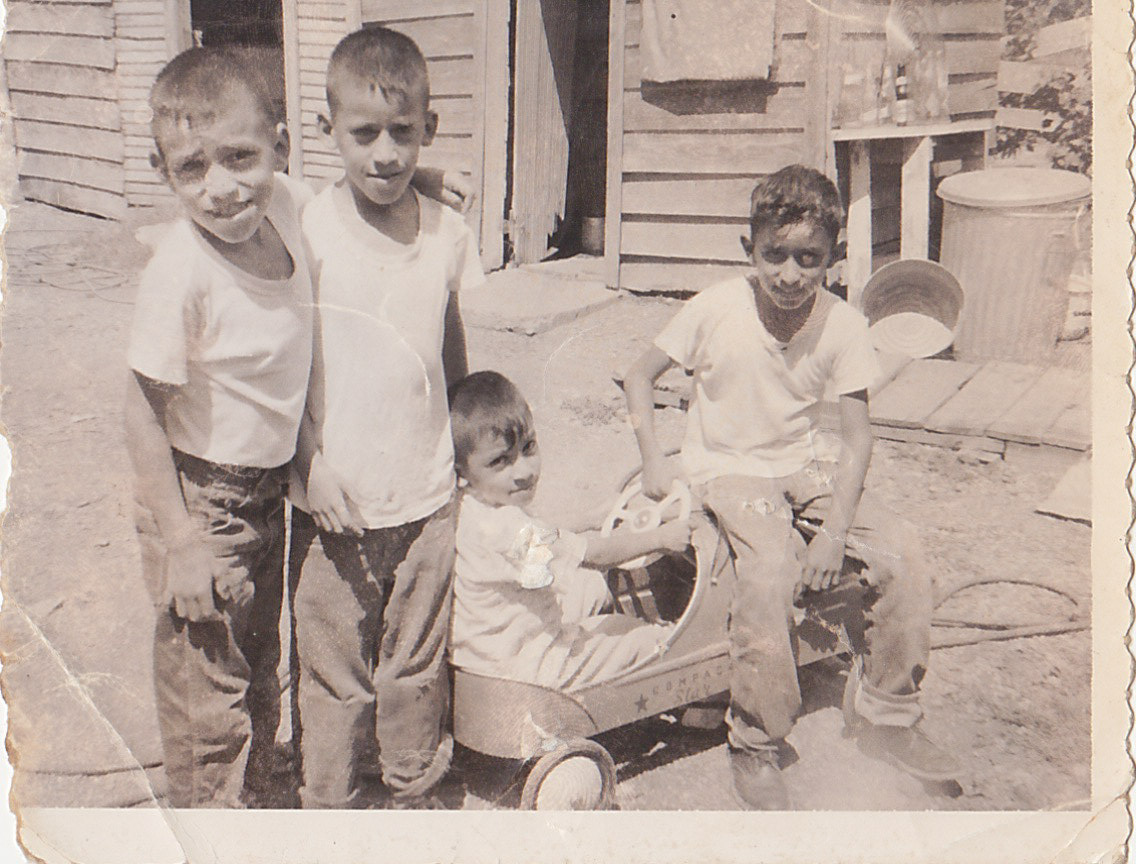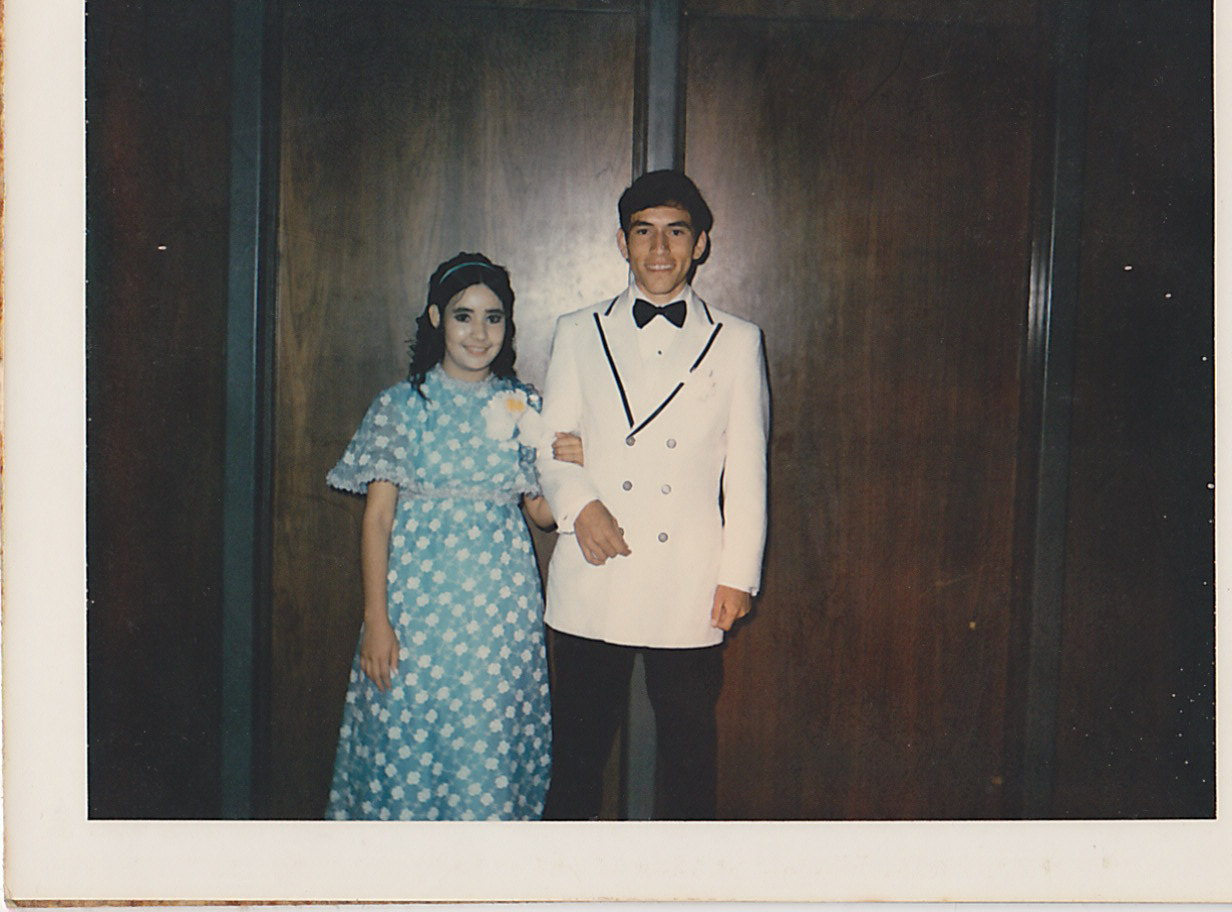TRANSCRIPTION
What was it like growing up in San Antonio in the 50's?
In the 50's life was very good, you could hang out with your friends in the neighborhood and not have to worry the things that kids worry about today. You could hang out at night also, there wasn't anything like a real curfew because it was so safe. It was fun, a lot of fun.


Speaking of fun, what kind of things did you do for fun?
There were some tv. shows that we use to copy. We would play cowboys and Indians, [but] my favorite thing to do was convince my brothers to play Superman. They would dress up, put towels around their necks, get up on the roofs of houses, jump off and try to fly. Grandma and Grandpa would get real mad at me because my brothers would wind up hurting themselves.
What was the west side of San Antonio like when you were growing up?
It was colorful, very, very colorful. At that time Guadalupe Theater was like a museum. They had Spanish tiles on the walls as you walked in, around the water fountains, and in the restrooms. If you've ever gone to the Majestic Theater, I'm glad they remolded it because it was that way with the Guadalupe. They even had an orchestra pit between the screen and the seats. It was elegant. The neighborhood was very, quiet, respectful, and colorful.
Where there any specific place did you and your brothers liked to go?
For one thing, The Casa Grande Restaurant before we would go to the Guadalupe Theater. It was THE restaurant of the time because it was very popular and everybody in the city knew about it. We didn't have money but our favorite thing to do was go there, it's no longer a restaurant but the building still stands. We'd sit down and of course the waitress would bring you a glass of water. We'd open up the menu, drink the glass of water and leave, just to say we'd been to the Casa Grande restaurant.
What kind of jobs did your parents have to support the family?
My mother didn't work, she was a housewife, and my father worked for the city of San Antonio with the City Sewage Treatment Plant.

What age did you start working as a child?
I started when I was five years old selling candy apples in the streets with my oldest brother Fred and my second oldest brother John. We worked from about 9 o'clock in the morning till about 2 in the afternoon. I would make about twenty cents a day, fifteen of which would go grandma and five I kept for myself.
As you got older did you continue to work?
I worked during the summers. My first summer job was working at Right Distributing. We would go door to door and put advertisements on the doors or fences for Handy Andy and other stores. I was about 13 years old. It was what I would consider my first full time job. Four out of five days a week.
When did you start learning to play the drums?
Believe it or not it was the night after I saw The Beatles on The Ed Sullivan Show. The one that I wanted to be was Paul McCartney , but I noticed this guy behind the three and it was Ringo. So the next morning I got an empty coffee can turned it upside down, took some twigs and stated banging away. And that's where my interest in drums came from.
What it was it like playing the drums in high school?
High school was fantastic because the high school that I went was known to have the best drummers in the state of Texas, it was Lanier High School. My sophomore year I didn't make it when I auditioned because the band director felt that the other drummers, that had been at Lanier since the 7th grade (I had gone to another junior high) with the band director, would create a mutiny if I made as a sophomore in my first year. My junior year I finally made it into the Lanier band and it was a fantastic experience. I was exposed to drummers who I knew were very very good. I wound up making 4th Chair District my first year. As a result the Band Director, Mr. Rodriguez, designated me as the section leader my senior year and it was great, it was a great feeling. I ended up making 1st Chair District, 1st Chair Area, and 3rd Chair All State my senior year.

You went to high school in the late 60's early 70's what was San Antonio like at this time?
San Antonio at that time, there was a lot of racial tension. The Vietnam war was going on so you had people divided . The people that were in ROTC at Lanier were pro Vietnam War. I myself and the people that I hung out with were more educated in terms of what was happening . So we understood and we tolerated people who had what I would call tunnel vision. But there also was a lot of pride for the city at this time because in 1968 The World's Fair had come to town so it was a chance for San Antonio to be showcased and be put on the map.

In high school were did you and your friends like to hangout?
Mary's was the place we'd like to hangout in the morning and afternoons, right across the street from Lanier High School. Mary's was basically a grocery store that had a huge open area in the front. It was a family owned place and we'd like to go there to eat doughnuts, drink big red, share stories, and record each other telling jokes. Mary's was the place to be.
How well academically did you do in high school?
Academically I did very well. I was ranked I would say in the top 12 percent in the class out of 596 graduates. So I think I did pretty good. The only thing I didn't like is that I wasn't accepted into the National Honor Society. Even today the situation is the same where they pass the list of nominees to your teachers and if one teacher doesn't like you basically get blackballed and you're not in. During graduation I saw some of my classmates that were in that I felt personally didn't deserve to be because I had better grades than they did. Now my SAT scores were very high. Sixteen hundred, but I took it three times because the first two times I did really bad. I ended up applying to Stanford University, UCLA, The University of Pennsylvania, The University of Houston, and the University of Texas. I wound up getting accepted to all of them, but I choose U.T because I wanted to be in the Longhorn band.
Can you tell me about your audition for the Longhorn band during the summer of 1972?
It was remarkable, we drove up to the campus right outside the band room that had been newly built. I asked my brothers to come inside but they wouldn't. so I walked inside and saw what looked to me as something in preparation for a concert. There was every imaginable percussion instrument that you can think of, and to the right I saw Big Bertha, which I had only seen on TV. To the left of the building a door opened and a man walked out with a clipboard in his hand and said, "So you're Mr. Gonzales, your band director seems to think that you're pretty hot stuff." Little did I know that my band director had written a letter of recommendation. For the next hour and half I proceed to sight read the snare drum, the bass drum, the symbol, the timpani, the chimes, every imaginable percussion instrument that you can think of. When it was over he sits down and starts reading out theses rules, "Well here in the Longhorn bandÖ" After a couple of minutes I stopped him and said, "Excuse me but did I pass the audition." He looked at me and said, "Consider yourself a full fledged member of the Longhorn Band." Man, I've been on cloud nine ever since.
What was your favorite memory from your time in the Longhorn Band?
The first game, because thatís when I recall it really sinking in. We marched into the stadium and itís much like the scene form the movie Rudy where he runs to field in full dress uniform. Thatís exactly how it felt so I identify with that character. I looked around heard this loud boom, the canon, and saw 80,000 fans cheering for the band. It was like a dream come true. I kept pinching myself and thinking, am I really here?
What did you get your degree in and what were your plans after you graduated?
I got my degree in Biology/Pre-med in the summer of 1977. At that time I had accepted to Baylor College of Medicine which was one of the premier medical schools in the world and the person that's the head of it was Dr. Michael DeBakey, the world renowned heart surgeon. Unfortunately that same summer my father suffered a massive stroke and he was the sole wage earner of the family so somebody had to get a job. I've been working ever since


Was there ever a time you thought about going back to school?
On occasion, sometimes when I speak to people and they ask me about my education and my background and I mention what I just mentioned theyíll then ask me "why donít you go back to medical school, youíre still young?" Well I have two teenage children, a boy and a girl, George Michael and Jasmine. So at this point my focus is on them.
Is there anything else you like to add to this interview?
What Iíd like to add is that I am very fortunate for the life experiences that Iíve had because itís helped me grow as a person and hopefully made me a better person. Also because of the way my mother and father raised me annd my brothers. So when I exhibit these attributes at work people sometimes respond in surprise. Letís say Iíll go up to someone, before I speak Iíll say excuse me because thatís how I was raised or Iíll knock on the door before going into someoneís office because thatís how I was raised.


